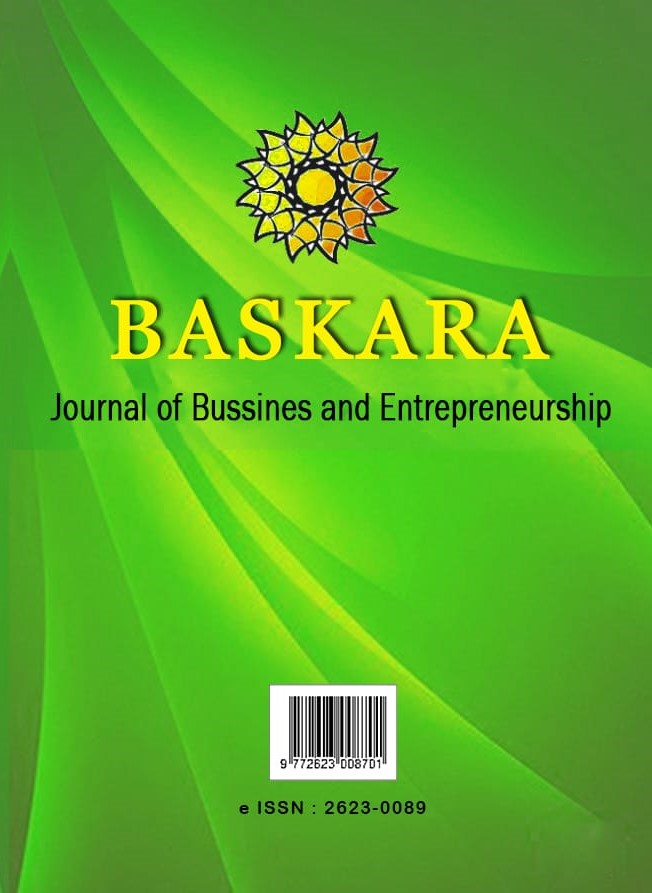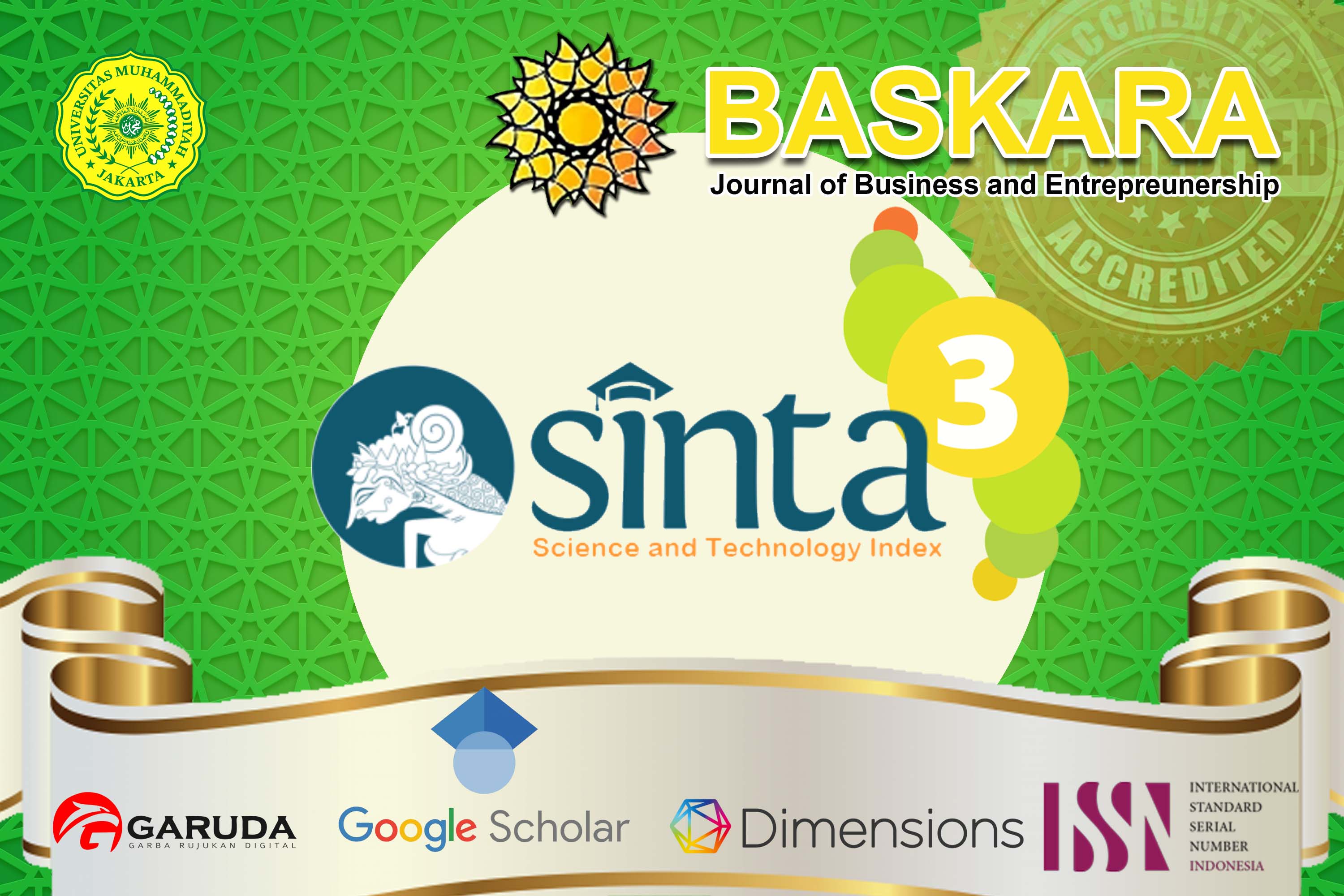Measuring the Role of Compensation as an Intermediary Variable in Measuring the Relationship between Management Talent and Employee Effectiveness
DOI:
https://doi.org/10.54268/baskara.v6i1.18684Keywords:
Compensation, Talent management, effectiveness, employeesAbstract
This study aimed to determine the effect of Talent Management moderated by Compensation on Employee Work Effectiveness. The sample in this study were employees at Aerotel Smile Hotel Makassar City. There are 50 employees as a sample. Three variables are used: talent management as an independent variable, employee effectiveness as the dependent variable, and Compensation as an intervening variable. This study uses a descriptive method with a quantitative approach, where data collection is done through interviews and questionnaires. The analysis tool used is Partial Least Square. While taking samples, the author uses the entire population. Data were obtained through interviews and distributing questionnaires to determine the influence of talent management and employee work effectiveness by making Compensation an intervening variable. The study results show that Talent Management positively and significantly affects Employee Work Effectiveness. Talent Management moderated by Compensation has a Positive and Significant Effect on Employee Work Effectiveness. In the future, the next researcher can add environmental conditions as a variable that affects work effectiveness.References
Abdul Rajab, Erwin Lessy, Muhammad Syafruddin, Nurlaely Razak, Muhammad Tafsir, (2023). The Influence of Organizational Culture and Compensation on Performance Through Work Motivation. Mirai Management Journal, Vol 8 No.2
Abdillah, Willy and Jogiyanto. 2015. Partial Least Square (PLS) Alternative to Structural Equation Modeling (SEM) in Business Research. 1st Ed. Yogyakarta: ANDI
Ariandi, F (2018). The Influence of Compensation Payment Methods on Tutor Performance. Ejournal, Economics and Management of Bina Sarana Informatics University. Vol.XVI No. March 1.
Asri, Nadira Femitri (2017). The influence of talent management on employee performance at P.T. The Charisma of marketing with the archipelago Thesis, Parahyangan Catholic University, Bandung
Bakker, A. B., & Bal, P. M. (2010). Weekly work engagement and performance: A study among starting teachers. Journal of Occupational and Organizational Psychology, 83(1), 189–206.
Berger, L. A. & Berger, D. R. (2008). The Handbook of Best Practice on Talent Management: Identifying, Developing, and Promoting the Best People to Create Organizational Excellence. Translated by Kumala Insiwi Suryo. Jakarta : Permata Printing.
Canon, J. A., & Mcgee, Rita. (2007). Talent Management and Succession Planning. The Chartered Institute of Personnel and Development. London.
Ghozali, Imam. (2011). "Application of Multivariate Analysis with the SPSS Program". Semarang: Diponegoro University Publishing Agency.
Halim, J & Andreani, F. 2017. Analysis of Motivation and Compensation Influence on Employee Performance at Broadway Barbershop Pt Bersama Lima Putera. Journal of Business Management, AGORA Vol. 5, no. 1.
Hasibuan, Malayu S.P. 2003. Organization and motivation are the basis for increasing productivity. Fourth printing. Jakarta: P.T. Literary Earth.
Hasibuan, Malayu S.P. 2017. Human Resources Management. Revised Edition. Jakarta: Earth of Letters.
Hasibuan, Malayu S.P. 2019. Human Resource Management (Revised Edition). Jakarta: Bumi Literacy.
Heinen, J. S., & O'Neill, C. (2004). Managing talent to maximize performance. Employment Relations Today, 31: pp. 67– 82.
Mensah, James K. (2015). A "coalesced framework" of talent management and employee performance: For further research and practice. International Journal of Productivity and Performance Management. Vol. 64, issue 4, pages 544 – 566.
Michaels, E., Handfield-Jones, H., & Axelord, B. (2001). The War for Talent. Boston: Harvard Business School Publishing. (Accessed September 14, 2016)
Michaels et al. (2001). The War for Talent. Boston: Harvard Business School Press.
Putri, Bunga A. 2018. The influence of talent management on commitment to competence development mediated by psychological contracts at P.T. Graha Segara. International Journal of Human Resource Management, Vol. 26 No. 20, pp. 2543-2568.
Schuler, R. S., Jacksnon, S. E., & Tarique, I. (2011). Global Talent Management and Global Talent Challenges: Global Talent Strategic Opportunities for HRM. Journal of World Business, 46, 506-516.
Downloads
Published
Issue
Section
License
In order for Baskara: Journal of Business and Entrepreneurship to publish and disseminate research articles, we need publishing rights (transfered from author(s) to publisher). This is determined by a publishing agreement between the Author(s) and Baskara Journal. This agreement deals with the transfer or license of the copyright of publishing to Baskara: Journal of Business and Entrepreneurship, while Authors still retain significant rights to use and share their own published articles. Baskara : Journal of Business and Entrepreneurship supports the need for authors to share, disseminate and maximize the impact of their research and these rights, in any databases.
As a journal Author, you have rights for a large range of uses of your article, including use by your employing institute or company. These Author rights can be exercised without the need to obtain specific permission. Authors publishing in Baskara : Journal of Business and Entrepreneurship have wide rights to use their works for teaching and scholarly purposes without needing to seek permission, including:
- use for classroom teaching by Author or Author's institution and presentation at a meeting or conference and distributing copies to attendees;
- use for internal training by author's company;
- distribution to colleagues for their reseearch use;
- use in a subsequent compilation of the author's works;
- inclusion in a thesis or dissertation;
- reuse of portions or extracts from the article in other works (with full acknowledgement of final article);
- preparation of derivative works (other than commercial purposes) (with full acknowledgement of final article);
- voluntary posting on open web sites operated by author or author’s institution for scholarly purposes.
Copyright Transfer Agreement for Publishing (Publishing Right)
The Authors who submit manuscript has to understand that if accepted for publication, mean that all copyright and publishing right of the article shall be assigned/transferred to Baskara: Journal of Business and Entrepreneurship as assigned publisher.
- CC BY-NC: This license allows reusers to distribute, remix, adapt, and build upon the material in any medium or format for noncommercial purposes only, and only so long as attribution is given to the creator.
It includes the following elements:
BY ![]() – Credit must be given to the creator
– Credit must be given to the creator
NC ![]() – Only noncommercial uses of the work are permitted
– Only noncommercial uses of the work are permitted
Baskara (C) Copyright (2022):
BASKARA: Journal of Business and Entrepreneurship by https://jurnal.umj.ac.id/index.php/baskara
is licensed under a Creative Commons Attribution-NonCommercial 4.0 International License








